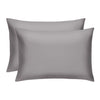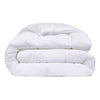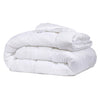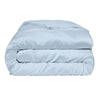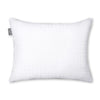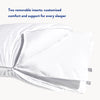The Daily Miracle
How To Choose the Best Sleep Position To Stop Snoring
Published
January 24, 2024
Author
Bridget Reed

Welcome to a world where a good night's sleep is not a luxury but a nightly reality. Snoring, often dismissed as a mere annoyance, can actually be a red flag for underlying health issues. It disrupts your sleep and that of your bed partner, leading to poor sleep for both.
Understanding your sleep posture and how it influences snoring is crucial for everyone seeking a restful night. Whether you're dealing with occasional snoring or more chronic issues like sleep apnea, the journey to a quieter sleep begins with exploring how your sleeping position affects your airway and breathing.
To help you get a more restful night’s sleep, we’re here to uncover the mysteries of snoring and how altering your sleep habits can lead to a serene, snore-free night.
Understanding Snoring and Its Impact
Snoring isn’t just a nightly nuisance but a sign that your body is struggling to breathe freely. When we sleep, our airway can become partially blocked, leading to the all-too-familiar sound of snoring. More than just a disturbance, it can be a symptom of sleep disorders like obstructive sleep apnea (OSA).
This condition not only disrupts sleep quality but also brings a host of health conditions into the picture, including high blood pressure and heartburn. Snoring occurs when the airflow through the mouth and nose is physically obstructed, which can happen due to various reasons such as the anatomy of your mouth and sinuses, allergies, or your weight.
It's not just an adult issue either; snoring can be a concern in children as well, often pointing to enlarged tonsils or adenoids. When it comes to health implications, snoring is linked not just to disrupted sleep patterns but also to more serious conditions like OSA, where the airway is repeatedly blocked during sleep.
This can lead to daytime sleepiness, fatigue, and even strain on the heart. Understanding these connections is crucial in addressing snoring and ensuring a good night's sleep.
Why Are Sleeping Positions Important?
Ever wondered why some positions seem to invite snoring more than others? The way we position our bodies at night can dramatically impact our airways.
For instance, back sleepers might find their tongue falling backward, creating a blockage that leads to snoring. On the other hand, sleeping on your left or right side can keep the airways open. It's fascinating how a simple change in posture can affect the soft palate, nasal passages, and airflow, thus influencing our sleep health.
This interplay between sleep position and airway mechanics is central to sleep medicine. For those struggling with obstructive sleep apnea, the gravity-dependent position of lying on one's back often exacerbates airway blockages.
This is where interventions like continuous positive airway pressure (CPAP) machines can be a lifesaver, providing steady airflow to keep the passages open. Moreover, research suggests that side sleepers, especially those who prefer the left side, may experience less acid reflux, a common irritant that can worsen snoring. This is due to the anatomical layout of our stomach and esophagus.
Neck and back pain, often associated with poor sleep posture, can also contribute to snoring. By adopting a sleep position that aligns the spine and reduces physical stress, you not only enhance your sleep quality but also open a pathway to a snore-free night. This makes understanding the science behind sleeping positions a key to unlocking better sleep and overall well-being.
Can Sleeping on Your Side Help?
Side sleeping might be your ticket to quieter nights. Why? This position helps keep your airway open, reducing the chances of snoring.
Side sleeping, particularly on the left side, can also improve heart health and blood flow, so there are additional benefits to sleeping on your side as opposed to on your back and your stomach.
This position is especially beneficial for those with pre-existing health conditions like heartburn or high blood pressure for this reason. For expecting mothers, left-side sleeping is often recommended to enhance blood flow to the fetus.
However, side sleepers should be aware of the potential shoulder and hip pressure that can be caused by sleeping on your side, particularly over time. Using a mattress that supports body contours and pillows to maintain neck alignment can mitigate these issues.
Even simply placing an extra pillow between your knees can help prevent wear-and-tear on these crucial joints over years of sleeping on your side.
Side sleeping can also be beneficial in clearing nasal passages, a boon for those with sleep apnea or sinus problems, leading to a more peaceful and uninterrupted sleep. (This is also worth keeping in mind when you simply have a cold or congestion keeping you up at night!)
Pro tip: If you're a habitual back sleeper, try placing a tennis ball in the back of your pajamas. This old-school trick can prevent you from rolling onto your back during the night.
What Else Can Cause Snoring?
While we're on the topic of snoring, let's not forget other contributing factors. Lifestyle can have a huge impact on the quality of your sleep and how often you snore.
Reducing alcohol consumption, especially before bedtime, can significantly decrease snoring. Alcohol relaxes throat muscles, leading to increased airway blockage. Similarly, smoking cessation can help, as smoking irritates and inflames nasal passages and throat tissues.
For those struggling with allergies, maintaining a clean sleeping environment free of allergens can improve breathing and reduce snoring. This means drying clothes and linens properly to avoid mold and mildew, which can trigger allergies — and it especially means keeping your bed sheets clean.
Switching to our Miracle Made® bed sheets can help because they’re made with antibacterial silver. The inclusion of silver naturally resists bacterial growth, meaning you can keep your sheets feeling fresher — and thus less allergenic — without having to double up on your laundry.
In fact, our sheets are so good at staying clean that you can count on 3x less laundry in your chore rota, especially when you use our Miracle Made® Laundry Detergent Sheets to do the washing.
Comprehensively addressing these factors can lead to a dramatic improvement in sleep quality and a reduction in snoring. It's about creating a holistic approach to sleep health, where every element, from lifestyle choices to the sleeping environment, works in harmony to promote a restful night.
The Bottom Line
In the quest for snore-free nights, choosing the right sleep position is key. Whether you're a side sleeper, a back sleeper, or somewhere in between, adapting your posture can significantly improve your sleep quality.
From adjusting your diet to consulting healthcare professionals, each step you take is a step toward a deeper, more peaceful sleep. Embrace these changes, experiment with different solutions, and find what works best for you. With the right mindset and tools, you won’t just be dreaming of better sleep — you'll be living it.
Sources:
Obstructive Sleep Apnea | National Library of Medicine
What Is Sleep Apnea | National Heart, Lung, and Blood Institute


